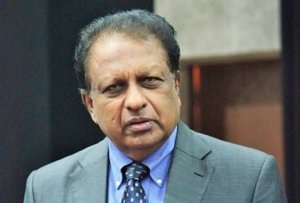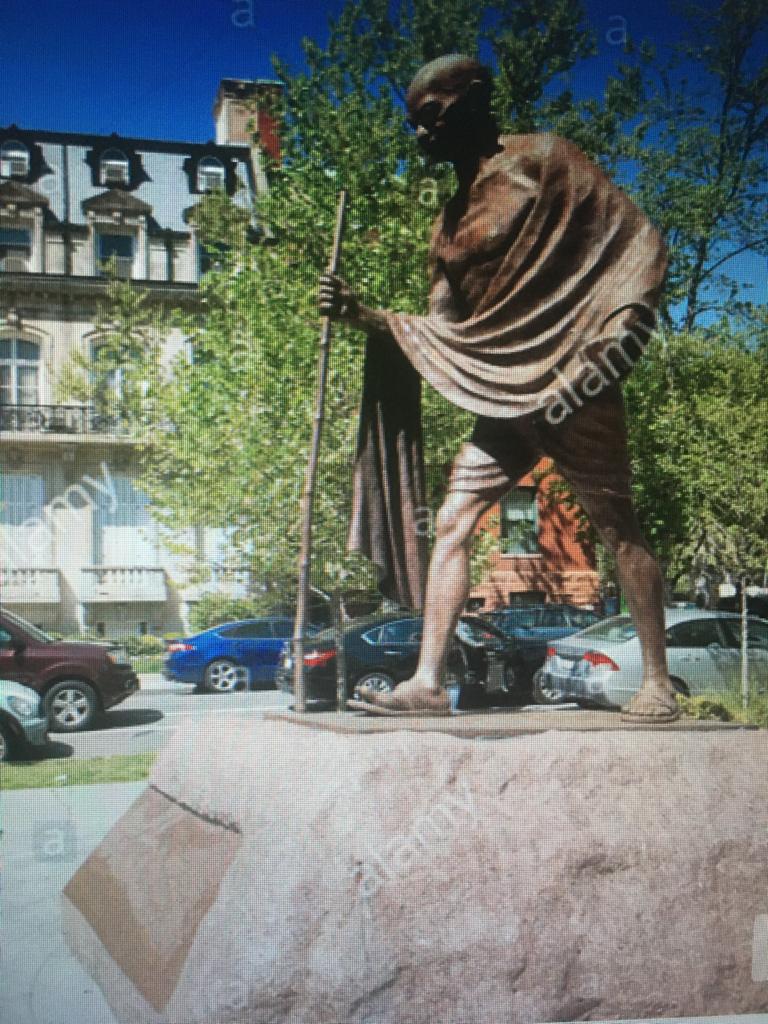
The Gandhi Magic

Gandhi Statue in front of the Indian Embassy in Washington DC
Everything that can be said about Gandhiji has been said. Much that should not have been said also has been spoken and written about him. But I consider Mahakavi Vallathol’s poem ‘Ente Gurunadhan’ the ultimate tribute to Gandhiji. It surpasses even Albert Einstein’s immortal words about him: “Generations to come will scarce believe that such a one as this ever in flesh and blood walked upon this earth.” Vallathol went to the extent of describing Gandhiji’s personality as a happy combination of the attributes of all the best in gods and human beings. Christ’s sacrifice, Krishna’s strategy for the protection of dharma, the Buddha’s non-violence, Sankaracharya’s mighty intellect, Harischandra’s truth, Prophet Mohammad’s determination and Ranthideva’s compassion had never merged together in one human being before. And more, only the land that is mother to Gita could have given birth to a Karma Yogi like him and so on.
We gave Gandhiji the status of an avatar as we could not imagine that any human being could have accomplished so much in one lifetime. Our evening prayers in our childhood referred to him as the immortal Gandhi Deva, together with Rama, Krishna and Shiva. But he was a man in flesh and blood, with the imperfections and weaknesses that go with men. But we found it convenient to consider him divine because we wanted to escape the responsibility of emulating him and be the change we want to be. Gandhi was what he was because he was a superman, we averred.
I have seen evidence of the Gandhi magic wherever I went in the world from South Africa, where he sharpened the weapon of non-violence, to the tiny Turks and Caicos Islands in the Caribbean, whose leader practiced smuggling as his pastime with a picture of the toothless smile of Gandhi behind him. The very magic, that mesmerised millions of Indians to take up his call to fight with bare hands and made the British might unable to extinguish the fire in him, still illumines the world. Without reading his writings or the massive material on him that has accumulated over the years, many countries and continents declared him the Man of the Twentieth century. He is the greatest peacemaker in the world, without being awarded the Nobel Peace Prize.
I have seen an Italian commercial of a telecommunication company recently. Gandhiji is shown for a few seconds, speaking to a few disciples in his soft and squeaky voice about leaving the doors and windows of our homes open for new ideas to flow in. In the next shot, the scene is the same and he says the same thing in the same voice, but now there is a little sophisticated device in front of him which is quite out of place in the Ashram. The next scene is of millions of people watching Gandhiji on giant screens in Madison Square Garden, the Red Square, the cafes in Paris, the bars in Havana and the beaches of Brazil. Then the screen becomes dark and the following words appear: “If Gandhi could communicate like this, what would have happened to the world?” and then stunned silence.
The commercial was striking in its imagination, but it did not take into account the fact that he changed the world without the internet, twitter, facebook and Instagram, with a two page journal, hand printed and distributed to a few. His moral force was such that his message travelled far and wide without a million followers on twitter. He put the telecommunications revolution to shame by reaching the hearts of mankind. Nobody could troll him or hack him to seek donations in crypto currency or to tarnish his image. His life was an open book, in which nothing could be interpolated. The Internet has not yet found a way to communicate with God as he appeared to do.
I witnessed how the Gandhi Magic worked wonders in the US Congress. The year was 1998. We were engaged in setting up a statue of Gandhiji in front of the Indian Embassy in Washington on Government land, a process which had started fifty years ago. The Massachusetts Avenue on which the Indian Embassy stands has many statues, some on horseback, flashing their swords, other writing poetry and others contemplating on the future of the world. Each step was arduous as various Congressional Committees scrutinised everything including the accuracy of the length of Gandhiji’s nose. I was quite worried as to what Gandhiji would look like in the final product. The statue could not be taller than the statue of Sir Winston Churchill at the other end of the Avenue in the compound of the British Embassy and so we had to cut the height of the pedestal as nothing else could be done to reduce the height of the statue.
One day before the final meeting of the Congressional Committee to approve the installation of the statue, India announced its nuclear weapon tests and declared itself a nuclear weapon state. President Clinton came down on us like a ton of bricks and imposed sanctions against India. India suddenly became persona non grata in the eyes of the Americans and most of the rest of the world. Among all the woes of the Embassy was the worry about the fate of the statue of Gandhiji. The first surprise was that the meeting was not postponed. But that was no guarantee that the approval would be given. We expected to hear lectures on non-violence and a decision that the statue could wait till India learnt to live in accordance with Gandhiji’s teachings.
The first Congressman to speak was Latin origin, who was known to be tough. As expected, he lamented India’s nuclear tests, which showed that India did not follow Gandhiji’s teachings anymore. Much to our relief, however, he went on to say that it was all the more necessary to erect a Gandhi statue in front of the Indian Embassy to urge those inside and outside to return to Gandhiji’s path. He strongly urged that the proposal should be approved. Several others spoke in the same vein, as though India should be reminded of its own heritage. We appeared chastised, but jumped with joy that the Gandhi magic had worked once again. There are many more instances of the Gandhi Magic I have experienced in different parts of the globe.
Today, Gandhiji is the most important instrument of our soft power, which is also known as smart power, together with the Buddha, Swami Vivekananda and other towering personalities India has produced. The immense benefit that India gains from those icons helps us to project India as the nation, which has shown the way to the world.
